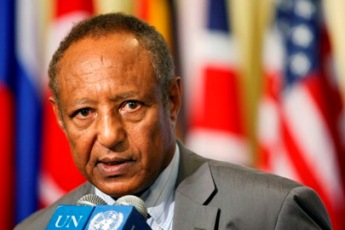UN special envoy says Hague court did not give Heglig to Sudan
May 27, 2012 (JUBA) – The United Nations Special Envoy for Sudan and South Sudan, Haile Menkarios, has downplayed Khartoum’s claims over ownership of Heglig (Panthou) based on the court’s ruling in The Hague in 2009 on Abyei.

Menkarios who held talks with the leadership of the new country on the resumption of peace talks in Addis Ababa on 29 May told the meeting The Hague’s ruling had never stated that Heglig (Panthou) was part of North Sudan.
The Eritrean diplomat further explained that the court only determined only the boundaries of the territory of Abyei area and not the borders between South Sudan and Sudan. He said the court simply stated that Heglig did not fall within the territory of Abyei.
He urged the two countries to resume the negotiations and find solutions to the outstanding post-independence issues.
The statements of the envoy seemed to have tallied with the arguments of the South Sudan government which dismissed Khartoum’s claims of Heglig based on the ruling of the court.
Officials in South Sudan argue that Heglig, which is locally known as Panthou in Dinka language, has always historically been part of the present Unity State or Western Nuer district during the British colonial era.
Leaders of the Sudanese Misseriya pastoral tribe, who claim the ownership of Abyei say the oil producing area is part of their territory in South Kordofan.
However, officials of South Sudan accused the successive Khartoum governments of attempting to annex Heglig to North Sudan following the discovery of oil resources in the area in late 1970s.
The latest attempt, according to the Vice President, Riek Machar, was when the President Omer Al Bashir’s assistant, Nafie Ali Nafie, instructed the former governor of Unity state, Joseph Nguen Minytuil, not to include Heglig in the map of Unity state in 2004, which Minytuil resisted.
Officials say they have the copy of the document which was communicated to the former governor by Nafie Ali Nafie.
Machar said Heglig continued to be administered under the jurisdiction of Unity state’s Pariang County until 2009 when North Sudan unilaterally misinterpreted the ruling and occupied the area.
Even during the population census of 2008, he said, Heglig’s population was officially counted to the population of Unity state.
These, he said, included a number of many other resource endowed areas including Karsana in Unity state in addition to others in Upper Nile, Northern and Western Bahr el Ghazal States.
“We did not want to immediately confront Khartoum over its occupation of our territories because we wanted the referendum [on self-determination] to take place,” Machar said.
The two countries are going for the renewed negotiations in Addis Ababa on Tuesday with Sudan’s President Omer Hassan el Bashir demanding that the issue of security including cutting any support to insurgency groups of each country by the other should feature first in the talks.
Machar, however, said addressing the security issues should also mean resolving the long awaited border demarcation between the two countries and the fate of Abyei, which are also needed to achieve long term security.
(ST)
